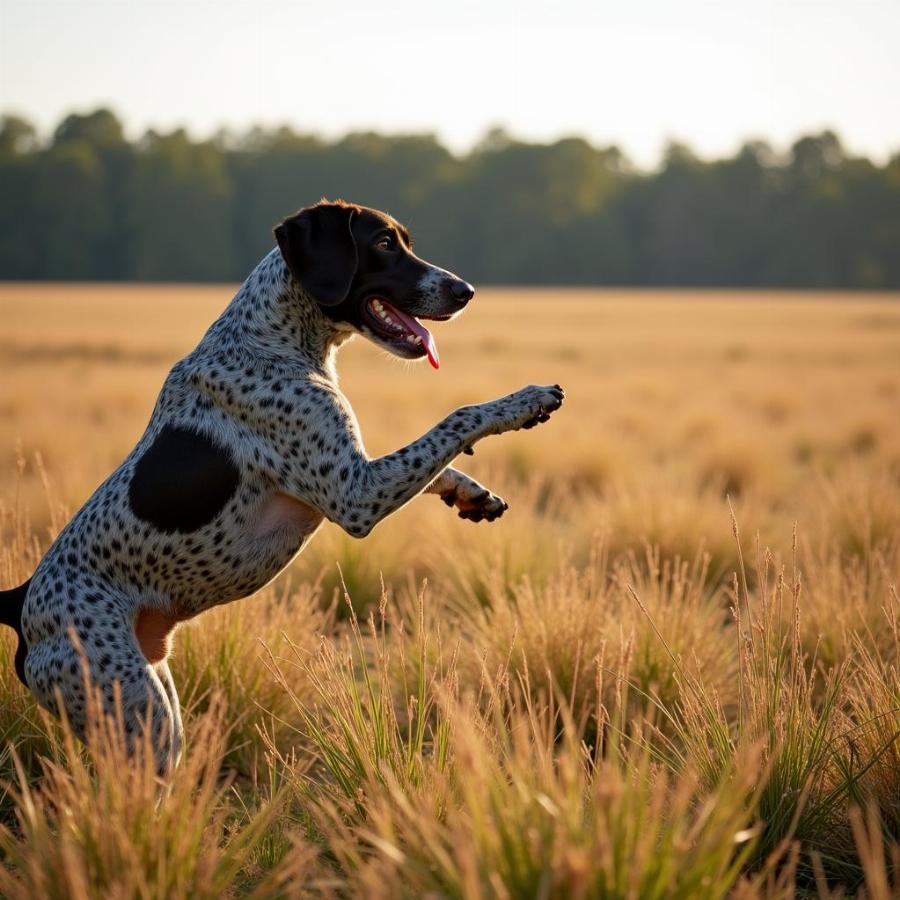The term “l19 bird dog” often sparks curiosity, particularly among dog enthusiasts. While “l19” doesn’t directly refer to a specific dog breed, it’s frequently associated with discussions about bird dogs, their training, and their roles in hunting. Understanding what people are looking for when they search for this term is crucial for providing relevant information. Are they looking for information about specific breeds commonly used as bird dogs? Are they interested in training techniques? Or perhaps they’re seeking historical context related to the term? This article aims to explore all these facets, providing a comprehensive understanding of bird dogs and their connection to the often-misunderstood term “l19.”
Delving into the World of Bird Dogs
Bird dogs are a specialized group of canine companions bred and trained for hunting game birds. Their skills encompass locating, flushing, and retrieving birds, making them invaluable partners for hunters. These dogs possess a unique blend of athleticism, intelligence, and a keen sense of smell. They are known for their unwavering focus, impressive stamina, and gentle mouths that ensure the safe retrieval of downed birds. Whether it’s the graceful pointing of a Pointer or the energetic flushing of a Springer Spaniel, each breed brings unique talents to the field. But what makes a dog a “bird dog”? It’s not just their breed, but also their innate instincts and the specialized training they receive.
 Pointer dog pointing in a field
Pointer dog pointing in a field
Popular Bird Dog Breeds
There’s a diverse array of breeds that excel in the role of bird dogs. Each breed possesses distinct characteristics and abilities that cater to different hunting styles and game bird species. Some popular breeds include:
- Pointers: Known for their stylish “pointing” stance, these dogs freeze when they locate game birds, allowing the hunter to approach.
- Setters: Similar to Pointers, Setters also “point” but often with a more crouched stance. Different Setter breeds exist, including English, Irish, and Gordon Setters.
- Retrievers: Breeds like Labrador Retrievers and Golden Retrievers are prized for their retrieving abilities, particularly in watery environments.
- Spaniels: Springer Spaniels and Cocker Spaniels are energetic flushers, driving birds out of cover for the hunter.
The Mystery of “L19”: Separating Fact from Fiction
The term “l19” itself doesn’t denote a specific breed or training technique. It’s often mistakenly associated with bird dogs due to its appearance in online discussions and forums. It’s likely a misunderstanding or a colloquialism that has gained traction. Focusing on understanding the specific traits and needs of bird dog breeds is far more beneficial than searching for the elusive “l19 bird dog.”
Training Your Bird Dog: A Journey of Patience and Reward
Training a bird dog requires dedication, patience, and a deep understanding of canine behavior. Early socialization and consistent training are key to developing a well-behaved and effective hunting companion. Basic obedience training forms the foundation, followed by specialized training focused on scent work, pointing, flushing, and retrieving.
Essential Gear for Your Bird Dog
Having the right gear is essential for both the safety and effectiveness of your bird dog. Essential items include:
- A well-fitted collar and leash: For control and safety during training and transport.
- A sturdy hunting vest: Provides protection from thorns and brush.
- A whistle: For long-distance communication.
- A dummy bird: Used for training retrieving.
Caring for Your Bird Dog: Beyond the Hunt
Beyond their role in the field, bird dogs are loving and devoted companions. Providing proper care is essential for their overall well-being. This includes a balanced diet, regular exercise, grooming, and routine veterinary checkups.
What to Consider Before Getting a Bird Dog
Bringing a bird dog into your life is a significant commitment. Before taking the plunge, consider the following:
- Your lifestyle: Bird dogs require ample exercise and mental stimulation.
- Your living situation: Do you have enough space for an active dog?
- Your commitment to training: Are you prepared to invest the time and effort required?
Conclusion: Embracing the Bird Dog Life
Owning a bird dog is a rewarding experience that extends beyond the thrill of the hunt. These intelligent and devoted animals become cherished members of the family. By understanding their specific needs and providing proper care and training, you can forge a strong bond with your bird dog and enjoy years of companionship. Remember, forget the “l19” myth and focus on learning about the individual breeds and their unique qualities. That’s the key to truly appreciating the world of bird dogs.
FAQ
-
What is the best age to start training a bird dog? Ideally, training should begin as early as possible, with puppyhood being the optimal time.
-
How much exercise does a bird dog need? Bird dogs are energetic breeds and require substantial daily exercise.
-
What are some common health problems in bird dogs? Hip dysplasia and certain eye conditions can be concerns in some bird dog breeds.
Further Reading on Beaut Dogs
- Bird Dog Training Tips and Techniques
- Choosing the Right Bird Dog Breed for You
- Essential Gear for Bird Dog Owners
Beaut Dogs: Your Ultimate Resource for Canine Companions
Beaut Dogs is your one-stop shop for all things canine. We provide expert advice, helpful resources, and a passionate community of dog lovers. From breed information to training tips, we’re here to support you on your journey as a dog owner. When you need assistance, don’t hesitate to contact us at [email protected]. Beaut Dogs is committed to providing you with accurate and detailed answers to all your dog-related questions.